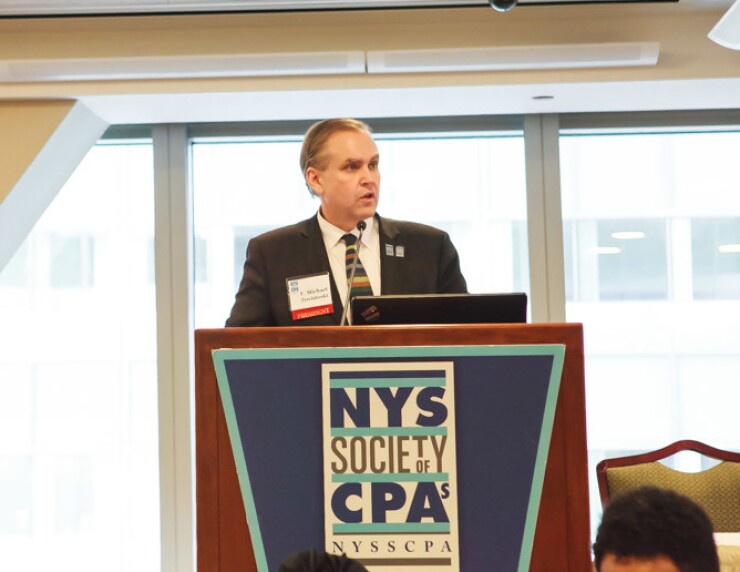While marijuana is now legal to one degree or another in 28 U.S. states, the substance is still federally illegal – and that means that CPAs and others who want to serve this potentially lucrative niche face questions of professional conduct that are not easily answered.
Having made the plant-based drug legal for certain medicinal uses in 2014 under the Compassionate Care Act, New York is one of those states in which marijuana can be legally distributed in some way, and recently, the New York State Society of CPAs hosted a symposium on the marijuana business. In a conversation before the day’s events began, society president F. Michael Zovistoski intimated that he is excited about the medical benefits cannabis can offer patients of all kinds. His opening remarks noted that the society prides itself on remaining ahead of the curve in all things that affect the accounting profession, and the opening up of marijuana laws should be no different.

Speaking at the event were representatives from all corners of the marijuana business landscape. IGC president Ram Mukunda spoke on a panel on practical business, legal and banking issues, and described his company’s aggressive approach in the marijuana market, taking high growth and high margin positions in electronics and cannabis because it believes the market for the plant’s medicinal uses will explode in the near future. The company is developing phytocannabinoid-based treatments to treat pain, PTSD, seizures, cachexia, chronic and terminal neurological and oncological diagnoses, and other life altering conditions.
However, as the company prepared to go public, Mukunda explained that it faced an uphill battle, as it was difficult to get listed on the major stock exchanges as a business that is tied to the marijuana industry. IGC succeeded, though, and are now public.
Etain Health, a marijuana grower in New York, faced similar obstacles when trying to find a bank to do business with, chief operating officer Hillary Peckham said. “We considered it a rite of passage, getting kicked out of our first bank,” she recalled with humor. Etain Health has since found a state bank to work with the company, but understands it may not be able to bank there forever. U.S. banks must adhere to the Bank Secrecy Act of 1970, which requires them to monitor customer accounts for activities associated with crime and terrorism. Because marijuana is classified as a Schedule 1 drug federally, marijuana-related businesses are considered criminal and the vast majority of banks will not tolerate their business.
Another, unexpected hurdle? Because marijuana is necessarily an all-cash business (because credit and debit card payments flow through banks), the cash that flows through grower, distributor or dispenser hands can and does smell like the plant. That is to say – it stinks. Taking that money to a bank guarantees being turned away, so business owners have taken to carefully sealing the cash in airtight vaults – which protects it from theft, too, as all-cash businesses are particularly vulnerable to crime – or deodorizing the money with Febreze.
What’s an accountant to do?
When asked for a show of hands, several New York accountants in the room indicated that they are already providing accounting services to marijuana-related businesses. Still others were considering doing so. Mat Young, vice president of state regulatory and legislative affairs with the American Institute of CPAs’ state regulation and legislation team, provided the institute’s guidance on getting involved in the marijuana industry.
The AICPA sees the benefit of accountants serving this industry. Accounting services will provide financial statement assurance, ensure tax compliance and contribute to the creation of well-run businesses, which are good for the economy. However, questions accountants must ask are is it ethical, discreditable, and/or illegal? There is state board guidance on the marijuana industry from Arizona, Colorado, Connecticut, Florida, Maryland, Nevada, Oregon and Washington. The general board positions are that serving the industry is not in itself discreditable and that the boards will not pursue independent disciplinary action, but the boards can still discipline a CPA found guilty of a criminal act. The AICPA itself does not have any formal position, and the bylaws still require that the AICPA sanction members who are disciplined by a board of accountancy or convicted of crime punishable by more than a year. The AICPA’s final recommendation is that a CPA must consult legal counsel before diving into the industry.





